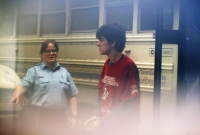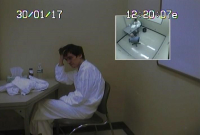Support strong Canadian climate journalism for 2025
Quebec's ombudsperson has criticized the way a social worker handled the case of the Quebec mosque shooter after he allegedly told her in confidence he regretted not having murdered more people, according to a report obtained by The Canadian Press.
Guylaine Cayouette was justified in going to police, but took sloppy and incomplete notes about her encounters with Alexandre Bissonnette, wrote Genevieve Lauzon, with the Quebec ombudsperson's office, in her report dated November 2018.
The report also said Cayouette didn't follow protocol after Bissonnette told her he wished more Muslims died in his shooting rampage.
Bissonnette shot six men dead in a Quebec City mosque in January 2017. He pleaded guilty in March 2018 to six charges of first-degree murder and six of attempted murder.
Cayouette, who works for an organization in Quebec City that offers mental health services to inmates, began meeting with Bissonnette in jail in February 2017.
A report she authored was entered as evidence during the killer's sentencing arguments. Cayouette recounted how Bissonnette told her on Sept. 20, 2017: "I regret not having killed more people ... The victims are in the sky and I'm living in hell.''
Bissonnette's parents lodged a complaint in September 2018 with the ombudsperson over Cayouette's interventions with their son. They claimed Cayouette told Bissonnette she "had seen everything in her career and that he could trust her."
Bissonnette's parents argued Cayouette shouldn't have gone to the police with the information or should have advised Bissonnette that she had the legal right to inform authorities about anything incriminating that he told her in confidence.
In Lauzon's report, she stated that Cayouette "could, according to the law, break confidentiality to reveal information given to her by your son." Cayouette believed she had "carte blanche" to report anything Bissonnette told her to police, because he had allowed her to say what she wanted, according to Lauzon.
The report stated, however, that Cayouette's official casebook on Bissonnette did not include any notes about her Sept. 20, 2017 session with the shooter, nor did it include information about her meeting the following day with two provincial police investigators.
Lauzon added that Cayouette went straight to officials at the detention centre to reveal what Bissonnette had told her, when the proper protocol indicated she should have first informed her superiors at the community organization.
Benoit Cote, director of the community group that employs Cayouette, said Friday that his employee feels she did the right thing.
"She feels good with her decision to have informed authorities about his comments," Cote said in an interview. "She felt it was her duty."
Lauzon's report recommended Cote's employees provide inmates with clear, written instructions indicating health workers have the legal right to inform authorities about incriminating information given to them during therapy sessions.
She also recommended Cayouette follow the proper protocol in the future, and to ensure her casebooks detailing her work with inmates be kept up-to-date and complete.
Cote said his organization has fulfilled all the recommendations and has gone further. "We will give training to all of our employees on matters involving confidentiality," he said.
Bissonnette's father, Raymond Bissonnette, declined to comment on the ombudsperson's report.




Comments